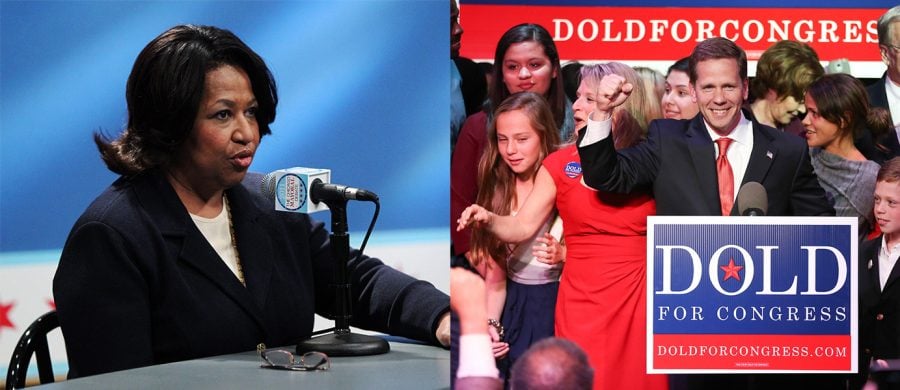Former members of Congress interact with students, answer questions about political process
(Left) Chris Sweda/Chicago Tribune/MCT (Right) Nuccio DiNuzzo/Chicago Tribune/TNS
(Left) Chicago, Illinois, mayoral candidate Carol Moseley Braun participates in a debate at WGN-TV in Chicago on Thursday, January 27, 2011. (Right) Republican Bob Dold speaks to his supporters at his election night headquarters on Nov. 4, 2014 in Libertyville, Ill.
April 13, 2017
Five former members of Congress encouraged students to get involved in politics during a discussion Thursday, responding to questions about government dissatisfaction and political decision-making.
More than 30 people attended the event, which was sponsored by Northwestern’s political science department. The event, held in Scott Hall, was part of the “Congress to Campus” program founded by the U.S. Association of Former Members of Congress. The program aims to connect students with former representatives to encourage democratic participation, according to the program’s website.
The panel included former U.S. Reps. Bob Dold (R-Ill.), Wendell Bailey (R-Mo.), Bill Enyart (D-Ill.), Tom Petri (R-Wis.), and visiting professor and former U.S. Sen. Carol Moseley Braun (D-Ill.).
Having a diverse and bipartisan group was intentional because the “whole idea” of FMC is to focus on governance and not political parties, Braun said.
Dold (Kellogg ’00) told The Daily he joined FMC because of the association’s extensive programming aimed to inspire students to participate civically in their communities. Members of the association frequently travel to college campuses to answer questions and talk to students, he said.
“It is important to get people engaged, answer questions and demystify the political process, and let them know that their voice makes a difference,” Dold said.
The panel was structured as a Q&A, which allowed the politicians to interact with attendees, Dold said.
In response to student concerns about mistrust toward the government and the focus on partisanship in politics, panelists urged students to make sure their voices are heard.
“If you withdraw, if you refuse to engage, then our country is going to be the worst for it,” Dold said. “It might be that you feel the government’s not speaking for you … that just means that you all need to make sure you’re active and engaged.”
The panelists also discussed decision-making in politics and voting when personal beliefs conflicted with the desires of constituents.
Braun said she tried to keep her word and stay consistent on issues when she voted. However, in tough decisions, “your conscience has to be your guide,” she said.
“You just have to go with what your head and your heart tell you is the right thing to do and make a choice,” Braun said. “You do your constituents a disservice if you try to … look at the poll numbers and see which way something is trending as opposed to what it is your heart tells you is the right thing to do.”
In contrast, Bailey said he made decisions always with his constituents in mind. As a representative, there is an obligation to serve the interests of the people, he said. Even though some decisions went against his personal beliefs, “sometimes you just have to grin and bear it,” he said.
McCormick freshman Ian Odland said hearing the representatives speak about their personal experiences in politics was the most interesting part of the event.
“That’s what this event really brings to the table,” he said. “I thought it was just an interesting experience just sort of to hear what goes on (in Washington).”
Email: [email protected]
Twitter: @madeleinemelody


